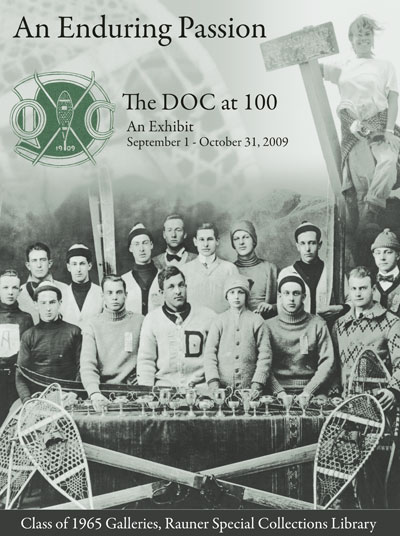An Enduring Passion: The DOC at 100

"I would insist that the man who spends four years in our North Country and does not learn to hear the melody of rustling leaves of does not learn to love the wash of racing brooks over their rocky beds in spring, who has not stood enthralled on the top of Moosilauke on a moonlit night or...has not thrilled at the whiteness of the snow-clad countryside in winter or at the flaming colors of fall -- I would insist that this man has not reached out for some of the most worthwhile educational values accessible to him at Dartmouth."
-- Dartmouth President Ernest Martin Hopkins
Selected highlights from the Outing Club's history, documenting the Club's founding in December 1909 as a winter sports organization, its ongoing enjoyment of the outdoors, and its stewardship of the natural world. Through Winter Carnival, First Year trips, affiliated clubs, and the miles of trails and numerous cabins it maintains, the DOC probably has touched the lives of more Dartmouth undergraduates than any other College organization.
The exhibition was curated by Barbara Krieger and Peter Carini and was on display in the Class of 1965 Galleries from September 1 to October 31, 2009.
You may download a small, 8x10 version of the poster: Doc at 100 (1.5 MB) You may also download a handlist of the items in this exhibition: DOC at 100.
Many of the materials in this exhibit are part of the DOC's manuscript collection (DO-1). A full finding aid is available online. If not otherwise noted, the item likely came from DO-1.
Materials Included in the Exhibition
Case 1. Establishing the DOC
On December 7, 1909, The Dartmouth published the following letter from Fred Harris, Class of 1911. His call for Dartmouth to involve itself in winter sports and to take full advantage of the opportunities that the College's "admirable situation" offered, resulted in an organization which has had a tremendous and lasting impact not only on the Dartmouth community, but on the sport of skiing, outdoor recreation, education and conservation, all firmly based on respect for the wilderness and with an enduring passion for the outdoors.
- The first Outing Club Constitution. (DO-1, Box 6170, Folder 1)
- The first formal meeting of the Outing Club, December 14, 1909.
- Standing: Cap Weston, Gordon Ferrie Hull, Craven Laycock, Walter Greenwood, unknown, unknown, and Russell Steinert. Middle: Dr. Licklider, William Patten and James Goldthwait. Front row: W. Lee White, Bradley Patten, Arthur Chivers.
- Logbook, Great Bear Cabin, December 1978. Illustrations by Robert Darce.
- Logbook from Moose Mountain, Cabin #1, the first entry in the first DOC cabin logbook, December 13, 1910.
- The DOC maintains a string of cabins and shelters along trails from Hanover to Lost River, and in the Second College Grant, most of them built by the DOC during its 100 year history. This first cabin, used by the Club between 1910 and 1913, was an abandoned lumber shanty on Moose Mountain.
Case 2. First Year Trips ("Freshman Trips")
- Moosilauke Ravine Lodge, the ultimate destination for all first year trips, was built 1938-1939, with loggers from the town of Warren and horse teams cutting and hauling the huge spruce trees used in its construction.
- Signing up freshmen members, ca. 1950.
- John Sloan Dickey at Moosilauke during freshmen trips, September 1956
- A college takes its personality in large part from those things in its daily life that set it apart from other colleges. The Dartmouth Outing Club perhaps more than any other undergraduate activity gives the College its distinct personality. -- Dartmouth President John Sloan Dickey
Case 3. Winter Carnival
In describing the advent of the Dartmouth Outing Club, the first such collegiate club, The Intercollegiate wrote in March of 1911, “Snowbound Dartmouth has long been accustomed to the ‘snow-shoer’ and the ‘skier,’ but never until the organization of this club has the attention of the college been focused so completely on winter sports.” Indeed, the first carnival, dubbed a Winter Field Meet by it’s founder Fred Harris, 1911, was primarily focused on winter sports. The first meet consisted of ski jumping, ski dashes and cross-country ski and snowshoe races. The club was involved early on in hiking and camping, but its primary purpose revolved around Carnival and winter sports. By the early 1930s the Winter Carnival had become an international event drawing competitors for Germany and Switzerland to compete in various skiing events.
- Fred Harris was inspired to create the first Dartmouth Winter Carnival after visiting the Montreal Winter Carnival in 1909. Here we see the programs that Harris added to his scrapbook following his visit. Fred Harris, Class of 1911, "Memory Book."
- Fred Harris, founder of the Outing Club, coming off the ski jump. [likely Winter Carnival Photo File]
- Prize winners of the first Winter Carnival, 1911. [likely Winter Carnival Photo File]
- Over the years other aspects of Carnival took on a more prominent role. As you can see in this flyer, bringing girls to the all-male campus was one of these.
- Dartmouth men impatiently await the arrival of the Carnival train. [likely Winter Carnival Photo File]
- The first Queen of Snows. [likely Winter Carnival Photo File]
- Skijoring. [likely Winter Carnival Photo File]